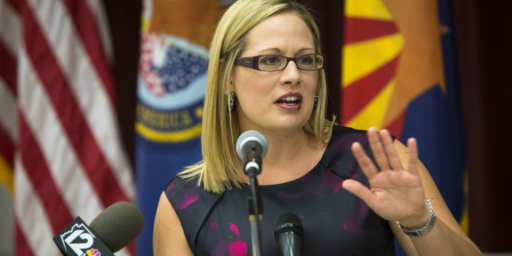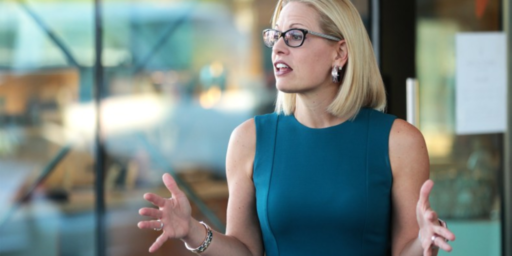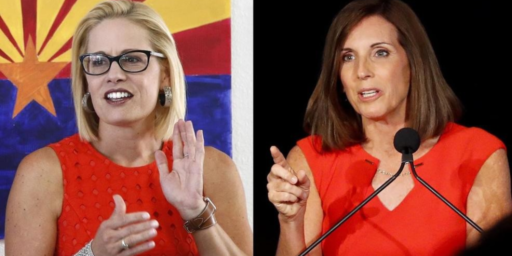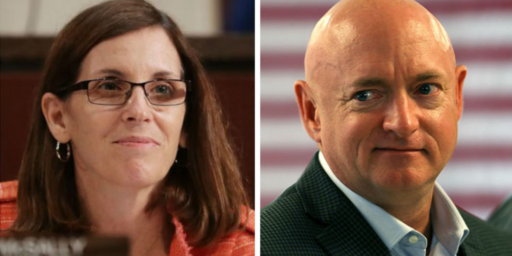Polarization and the Media
Rules for covering the Senate trial highlight changes in how we get the news.

The NYT has a piece on the rules that are being instituted for the coverage of Trump’s impeachment trial in the Senate: Even C-Span Is Piqued: Senate Puts Limits on Trial Coverage.
Journalists are up in arms about new restrictions on their movement inside the Capitol, which they say will prevent them from easily interviewing lawmakers about the proceedings. The rules, negotiated by Republican Senate leadership, have yet to be written down, causing confusion among reporters and the Capitol Police expected to enforce them.
Even sedate C-Span is aggrieved, calling on the Senate to allow its television crews to document the trial, instead of the government-controlled cameras that — as was the case during Bill Clinton’s trial 21 years ago — will limit what viewers see and hear inside the Senate chamber.
In regards to the cameras, while it would be preferable from a production and documentary point of view for C-Span to run the cameras, I am not surprised by this rule. First, the Republican majority would like to curtail as much drama as possible. Hence, fixed, government-controlled cameras fit the bill. Second, the Senate is still using rules from the Johnson impeachment as the basis of the current proceeding. As such, it is no shock that they are using the TV rules from the 1990s.
“Those cameras operate under very strict guidelines: They show the person who is speaking, and maybe some wide shots,” Terry Murphy, vice president for programming at C-Span, said in an interview. “They can’t show others reacting or listening. Having our own cameras in there would allow us to cover the trial with a much more full picture of what’s going on.”
C-Span wrote to the Senate majority leader, Mitch McConnell, in December, formally requesting access. As of Saturday, the network had heard nothing back.
The issues of restrictions of access to Senators by reporters is more troubling if one is interested in thorough coverage. But, of course, that isn’t the goal of the majority and so curtailments are not a surprise.
Along those lines, the following really struck me:
“There’s long been this understanding that we both serve the same people at the end of the day, and that it’s a mutually beneficial relationship,” said Sarah Wire, a Los Angeles Times reporter who leads a committee of congressional correspondents. “Senators want to talk to us because they know we’re communicating their message to their voters back home.”
She is appealing to a paradigm that is breaking down, if not already largely gone. There was a time when yes, Senators needed the local papers, radio stations, and TV channels to be the conduit of their messages back to their constituents. Now there are multiple means to accomplish this.
Not only can Senators use social media for direct connections, the main conduit is clearly more partisan-based media platforms. The dust-up between Senator McSally (R-AZ) and a CNN reporter this week illustrates this.
McSally then took to social media and Fox News to bask in the glow of sticking it to CNN. And, of course, Team Trump responded as well:
One’s mileage may vary on CNN, FNC, McSally, and so forth, but this is all a clear indication of the ongoing breakdown of a shared media narrative. It certainly show the significant severing of the relationship between the local media and members of Congress.
The more we, as citizens and voters, occupy different media universes, the worse it is for democracy. It certainly fuels polarization and tribalism.
In McSally’s case, it also show that she firmly believes her only chance of being elected to the Senate (remember: she lost her election and is serving in an appointed capacity) is to embrace the Trumpist approach.





McSally is going to have to do a lot more to prove herself to Cult45. She is, in their eyes, spineless. Some grudging approval was accorded her for calling the reporter a liberal hack.
McSally is toast. She just doesn’t know it yet. Kelly is a very good candidate. Former Astronauts are hard to paint as “Un-American Libtards”
There are no longer agreed-upon or at least widely-respected institutions to set a standard of reality. There never was agreement on reality, but there was a knitting together and trimming of world views via institutions like the church, social organizations, the media. Now life isn’t just ‘choose your own adventure’ it’s ‘choose your own reality.’
As a person whose career involves creating various fictional realities it’s like watching amateurs try to write Lord Of The Rings. Their alternate worlds are just sketches with huge inconsistencies and gaps. Which works if you’re dull enough not to notice. The paradigm most familiar to those people is the Christian reality which God knows (heh) is thin gruel if you spend more than a half an hour thinking about it.
With the Christian world view in tatters, along comes Fox News to create its own alternate reality with the added surface plausibility of splashy graphics, video clips and angry media demigods. It’s like the kind of world-building you might find in a Harlequin romance novel – silly, dumb, transparent but emotionally satisfying. Given the choice between the reality of an indifferent universe in which a short-lived human being is sort of the Planck length of consciousness on the one hand, and an emotionally satisfying fiction, most people prefer the made-up version.
This is the thing that scares me most, that Republicans are creating their own take on reality. If nothing else, our resident trolls illustrate how much their view of reality differs from that of most of us. And I only see it getting worse, I really feel this is going to end badly.
If Shelly Adelson, or someone like him, were to buy NYT we could pretty well kiss off democracy. And some days it looks like Kid Sulzberger is pumping up the books to put it on the market.
This affects more than just the media. One of the major functions of political psrties is as a heuristic for voters. Yes, it is still necessary for that to be the case, but in a much different way.
From when America was founded until the Mid-20th Century, the news cycle went at a slug-like place. The legislatures had temporal-based parliamentary rules to allow for the pace of travel. The only time people actually saw candidates was in person.
I feel a tinge of irritation when people discuss the electoral college and argue that it ensures attention is paid to sparsely populated states.
The counter-argument often made–that in modern times it actually just leads to them focusing on a handful of moderately populated, competitive states–is solid.
But there is an equally strong, simpler srgument to be made. It is simpler, becauee it doesn’t require data. Mass communication eliminates the need for candidates to travel to deliver their ideas and platforms.
Radio and then TV allowed the candidates to address the entire nation simultaneously, something that was not possible before that. The media could report it for those that could not listen/view st the time of the broadcast. The internet allows for communication (written, audio, or video) at the convenience of the audience.
The only added value from visiting a state is just emotional. It makes voters feel like the candidate is paying attention to them. That reason is totally divorced from what voting is supposed to be, a rational exercise. From the candidate’s perspective, it’s not a method of explaining anything. It is a way to excite and exhort voters to action. It’s all rhetoric and feelings.
In the context of the electoral college, this phenomenon has nothing to do with its original intent. Even etting aside that it’s pretty plain that the popular reason for it isn’t even historically true.
In the context of the media, the shift toward editorial content, especially on cable news networks, is probably partially a result of this as well. Straight news reporting is redundant, if you ignore that people watch the news far more often than they read a candidate’s platform.
I really wish this topic were more popular here at OTB as, to my mind, it ranks second only to the concentration of wealth when it comes to what ails the country. Democracy cannot function without an informed electorate. The First Amendment, apart from the bit about religion, is all about this: people must be able to speak the truth and communicate it to others, not because we are free but rather to keep us free. This understanding has broken down. And were a new generation of founders to set about preparing a fresh, young land for democracy, this topic would, along with the nature of wealth, occupy a serious place in their thoughts.
I know that I’m risking becoming something of a crank on this subject.
The Senate GOP wants no witnesses, as little TV coverage of the trial as possible, and to end the trial as soon as possible. I’m sensing a pattern.
@Kit:
Nah, you’re not a crank. Sadly, the same party that treats gun rights as the key bulwark against tyranny, is willing to compromise the rights–free speech, free press, universal suffrage, search and seizure limits–that actually do form a levy against oppression.
Of course, an armed insurrection would be put down with overwhelming force. But self-interested politicians would be forced to listen if a large enough group of their constituents demonstrated.
Of course, instead, they do everything they can to mute dissent and prevent people from throwing them out of office.
“Alternative realities” are bullshit, disinformation pumped out by the likes of Fox News, KellyAnne “alternative facts” Conway, Putin’s trolls and bots etc.etc. etc. There is only one objective reality.
Here is McFaul at the Post on that:
https://www.washingtonpost.com/opinions/2020/01/13/be-prepared-fight-dangerous-new-wave-disinformation-during-senate-trial/ ..
@charon:
The objective reality is that we all die and are soon forgotten. We are creatures of very short duration, in one place, on one planet, in one system in one galaxy among billions of galaxies in an incomprehensibly vast universe that may be only one of an infinity of universes.
Not everyone can handle that, hence religion. And in our society religion is the virus of unreality. Once you decide to believe in a magic sky daddy who will take all the good little boys and girls to his gilded McMansion in the sky, why not believe in leprechauns or orcs or Donald Trump?
@Kit:
But what is there to say about it? It’s obviously bad.
And it’s why we don’t have many commenters from the FoxNews bubble, and why the ones we do have kind of suck — there’s very little shared language or shared experience. We all see Trump’s speeches, but we see them from radically different perspectives. And make no mistake — Trump isn’t talking to us, he’s talking to them, in their language.
It’s like the stoned college students who ask “do you see the same blue I do? What if we all have the same favorite color be we just don’t know it?”
And, there’s a bubble beyond Fox, or many bubbles as I have no idea if InfoWars folks and QAnon folks are the same or different bubbles. I can’t distinguish between the crazy once it gets too far out there.
Short of rounding people us and sticking them into FEMA re-education camps, I don’t know how we fix that. And, frankly, I don’t have the organizational skills to run a re-education camp, so what do I do?
@Michael Reynolds:
Most magic sky daddies that have caught on in the past thousand years have told people to take care of the poor, love thy neighbor, etc.
It requires a huge cognitive leap to skip over those parts. Bigger than the leap to believe in sky daddies.
There’s less of a difference between people who think “Peter and the Wolf” is a fairytale and the people who think that Peter is a historical figure than there is between the people who think the moral is that Peter shouldn’t be lying, and the people who think that the moral is that the wolf was clever to identify the opportunity created by Peter’s lying and we should all be like the wolf.
And the singular most damaging of these means has turned out to be Twitter. Trump has demonstrated the power of a direct line to one’s most rabid supporters. It doesn’t matter in the slightest that 95% of what he tweets is easily debunked horse manure or that the tweets are often inconsistent or that they appear unhinged to any discerning person seeking information. The Trumpkins are the farthest remove from discerning, so to them each tweet is a hit of some exhilarating drug.
Beyond the base, Trump’s Twitter feed is clearly overwhelming. Other Republican politicians fear it like nothing we’ve seen before, because they are certain that even the slightest challenge to Trump and he’ll put out a tweet that places them between a mob of MAGA junkies and their next fix – a very dangerous place to be.
Traditional media can’t touch Trump because he’s taken them out of the equation.
So what happens when the Democratic version of this comes along…
Social media may have one positive consequence. If everyone relies on it for news about what public officials are saying, it will leave journalists no alternative to making their living reporting on what public officials are doing. And that would be a welcome and long overdue development.
@An Interested Party: I’m not sure it’s possible. Democratic candidates and their followers are too willing to eat their own young for “purity tests”. They will never be able to get all these “competing interests” under an actual big tent unless Trump actually does start rounding people who talk badly about him up and putting them in Guantanamo.
And even then, how would we know? They’re already willing to lie about “casualties” at a base in Iraq.
Fox News, and now Trump, have been wildly successful in dumbing things down to “We’re good, they’re bad”. Team sports. It will take a major event to coalesce Democrats into the unity Trump has with his base.
I’m reminded of a story I saw years ago about HW Bush. Said when was in Congress he’d sit in DC and do what he thought best. Then every election he’d go home and tell his constituents whatever they wanted to hear. The story said he saw no particular relationship between those two activities. He was able to do that because the DC and NY papers reported on what he did in DC and the Houston papers reported what he said in Houston.
@gVOR08: While I cannot confirm that story, it brings to mind a concept that a political scientist (Fenno) used to describe this: Home style and Hill style (i.e., how members of Congress behave in their home districts and on Capitol Hill). The concept was developed in the 1970s. Part his work did discuss media. Without a doubt there is still some Home style/Hill style difference, they cannot be the same now as they were in the pre-internet era.